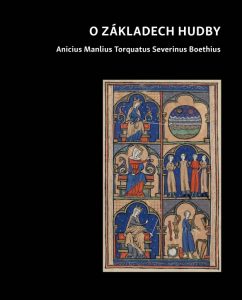
The five-book treatise De institutione musica (Fundamentals of Music) by Anicius Manlius Torquatus Severinus Boethius (c. 480 – 524) is, with its more than one hundred and sixty manuscript occurrences, the most widely published music-
-theoretical work of the European Middle Ages. Like other treatises by Boethius, De institutione musica is based upon earlier texts. The first three books are probably translations of the now lost treatise Eisagógé harmoniké (Introduction to Music) by Nicomachus of Gerasa (c. 60 – c. 120 CE), the fourth draws on the Katatomé kanonos (Division of the Canon) attributed to the mathematician Euclid of Alexandria (3rd century BC), and the fifth book – preserved in fragments – is a paraphrase of the Harmonika (Harmonics) of Claudius Ptolemy (first half of the 2nd century CE).
This book is the first complete translation into the Czech language. It is based on the text of Antonín Burda (1902–1982), which was radically revised and edited by Michal Ctibor (* 1990). It is further equipped with a new preface, annotated apparatus and an explanatory glossary of the most important terms.
